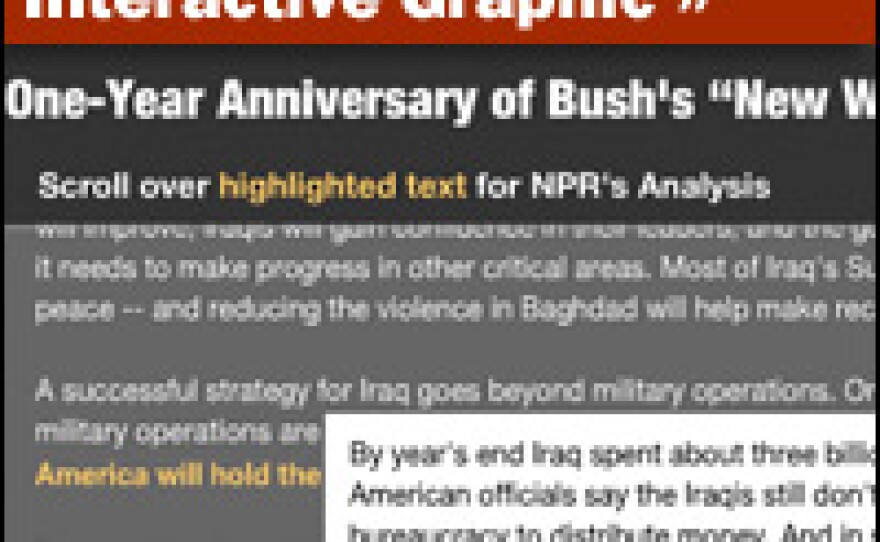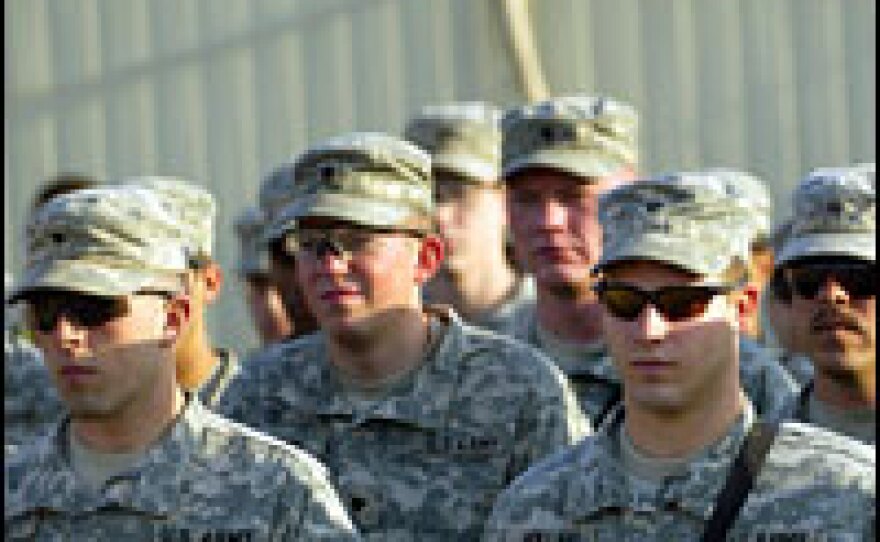
One year ago this week, President Bush outlined a new strategy for Iraq.
In a nationally televised speech from the White House, Bush unveiled the so-called "surge" in U.S. troops — and more American economic aid. Bush said the government of Prime Minister Nouri al-Maliki pledged to do more to heal his country's divisions.
Since then, some of what Bush envisioned has been accomplished, and some remains to be done.
In January 2007, when Bush made his "New Way Forward" speech, violence in Iraq was steadily rising, especially in Baghdad. There were car bombs exploding, shootings taking place and ethnic cleansing of neighborhoods.
"The situation in Iraq is unacceptable to the American people and it is unacceptable to me," Bush said.
So, the president sent in 30,000 more American troops, most of them to Baghdad. And he said the Iraqis would boost their own troop levels.
But a year later, the number of Iraqi brigades has dropped in Baghdad from 18 to 15. Some of the units have been sent by the Iraqi government to other hotspots. Many National Police units are still linked with Shiite death squads.
"They have a lot of very, very serious issues within the National Police," former Washington, D.C., Police Chief Charles Ramsey said on NBC's "Meet the Press." He was on a high-level panel looking at the Iraqi security forces. In September, the panel recommended disbanding the National Police.
"They need to be refocused because currently they are not performing at an effective level, and if what you want is a police force rooted in democratic principles, the National Police missed the mark," he said then.
American commanders in Baghdad refused to disband the National Police. They instead chose to retrain them and to replace corrupt commanders.
The National Police are just one example of the stubborn sectarianism — especially between Shiites and Sunnis — that Bush said last January would be a thing of the past.
"Prime Minister Nouri al-Maliki has pledged that political or sectarian interference will not be tolerated," Bush said in his speech.
In some cases it has been tolerated by Maliki's Shiite-led government. In the Baghdad neighborhood of Sadiya, an armed citizens' group organized by the Americans was pulled off a checkpoint in the fall. Why? The citizen's group was all Sunni.
A big part of the president's speech a year ago focused on Iraqis taking control of their streets and taking over more responsibility.
"… to establish its authority, the Iraqi government plans to take responsibility for security in all of Iraq's provinces by November," Bush said.
By year's end, Iraq controlled just nine of the country's 18 provinces. The American ground commander, Lt. General Ray Odierno, said he didn't want to move too fast on the turnover – that security is still tenuous in many areas.
"Turning over responsibility not only in Baghdad, but all of Iraq, is a very deliberate process. We will not give back any of the hard fought gains because we tried to rush the process," he said.
There's been no rush when it comes to legislation. Iraqi politicians were supposed to pass an oil law. But the law did not pass. There are still deep divisions, especially with the Kurds in the north, who want more control over the oil in their region. But American officials say oil revenues are being distributed on a roughly per capita basis without the law.
"To empower local leaders, Iraqis plan to hold provincial elections later this year," Bush said.
Provincial elections were not held. Sunnis want them so they can have a greater say in how they are governed. The Shiites are stalling. American officials now hope elections will be held sometime in 2008.
Bush also said the Iraqi government would reform de-Baathification laws. But the government has not reformed these laws. It would allow into government jobs thousands of Sunnis, many of them low-level members of Saddam Hussein's Baath Party. American officials say the bill has a good chance of passing this year.
Then there's the issue of money. President Bush said Iraq would spend more of its own money, not just rely on the hundreds of billions of dollars coming from America.
By year's end, Iraq had spent about $3 billion of the $10 billion Bush said it would spend. American officials say the Iraqis still don't have a competent bureaucracy to distribute money. And in some areas, they say, money is withheld because of sectarian reasons.
Last January, President Bush made it clear the Iraqi government was running out of time.
"If the Iraqi government does not follow through on its promises, it will lose the support of the American people. And it will lose the support of the Iraqi people. Now is the time to act," he said. Bush also said the United States would hold the Iraqis to certain benchmarks that had been set.
Secretary of State Condoleezza Rice downplayed those promises by year's end in a switch from Bush's tone in January.
"I no longer think of them so much as benchmarks as the pieces that they are now presenting as what they need to do over the next year," she said on Dec. 21.
The American ambassador in Iraq, Ryan Crocker, struck a similar chord, telling reporters recently he was no longer willing to make predictions tied to dates on the calendar.
Crocker says Iraq is a substantially better place because violence is down. On the political front, he says, there are considerable challenges ahead.
Copyright 2022 NPR. To see more, visit https://www.npr.org. 9(MDAzMjM2NDYzMDEyMzc1Njk5NjAxNzY3OQ001))







